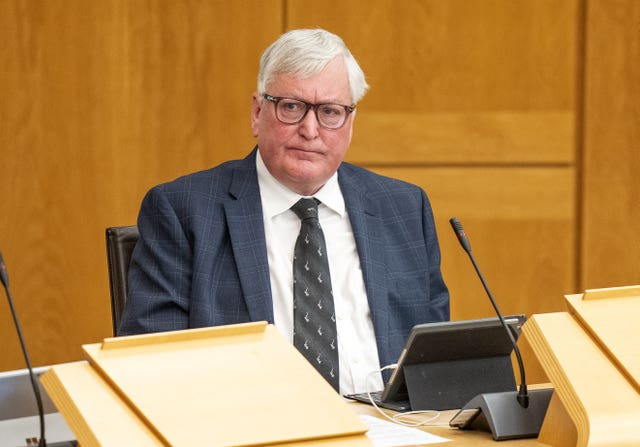Almost two-thirds of MSPs want more freedom to vote with their conscience, a survey of Holyrood politicians has found.
Total Research polled 53 MSPs for Holyrood magazine, and found 65% of them support more freedom.
The findings are published after SNP members in the Scottish Parliament voted to suspend veteran MSP Fergus Ewing from their group for a week after he voted against the Government in a vote of confidence against a Green minister.
Mr Ewing, who has been an SNP MSP since Holyrood was established in 1999, has also spoken out against the Government on issues such as the party’s powersharing deal with the Scottish Greens, the stalled deposit return scheme, and the new licensing scheme for short-term lets.

The poll also revealed 55% of the MSPs questioned said they belong to a specific religion or faith, with just under a quarter (23%) saying religion has a very important role in their life.
In the SNP leadership contest this year, candidate Kate Forbes sparked a backlash after she spoke out about her religious beliefs, saying she would have voted against same-sex marriage if she had been an MSP at the time the legislation went through Parliament.
Christianity is the most common religious group MSPs said they are a member of, but others gave their faith as either Islam or Hinduism.
More than three-quarters (77%) of the politicians who responded said they were brought up in a religious setting.
Just over a third (35%) said they feel directed by the teachings of their religion, but only a fifth (21%) said this influences how they make decisions in the Scottish Parliament, when, for example, voting on legislation or contributing to debates.

More than half (55%) said they feel comfortable airing their religious views in public, while 18% said they feel belonging to a religious group is a barrier to progression in politics.
One MSP said: “My religion influences my beliefs in social justice and fairness, and it is these I try my best to live by in practice.”
Another said: “Politics must be respectful of faith even if it is not observed by politicians.”
An overwhelming majority (96%) of the MSPs questioned said sectarianism is still a problem Scotland needs to tackle.
One MSP said: “Scotland still has spectacular issues with sectarianism, which has seeped into our politics.
“By its very nature, unionism and nationalism attracts the divisions of long-held Protestant/Catholic divisions in society, akin to, but thankfully not as destructive as, Northern Irish politics.
“It is there but no-one wants to talk about it.”
